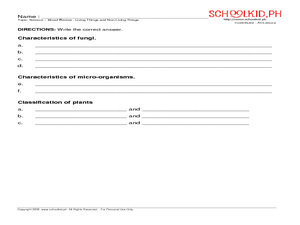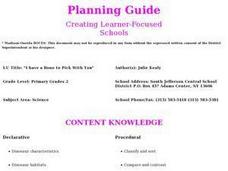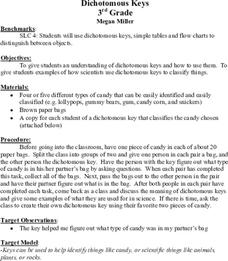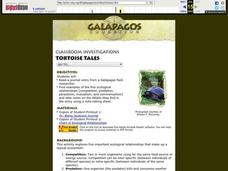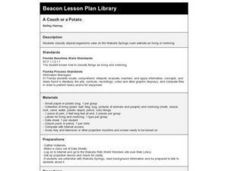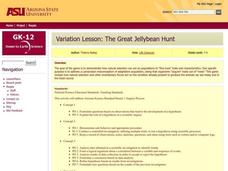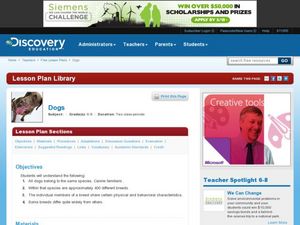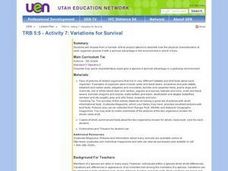Curated OER
The Three Worm Phyla
Ninth graders examine the three worm phyla. In this classification lesson, 9th graders observe, compare and contrast the planarian, tapeworm, and fluke.
Curated OER
Ocean Life Zones
In this ocean activity, students answer questions about ocean life, the plants and animals of the ocean and their classification, the major life zones of the ocean and questions about an animal of their choice that lives in the ocean.
Curated OER
Science - Mixed Review: Living Things and Non Living Things
In this living and non living things worksheet, students fill in a mixed review that has them answering questions in the true and false, short answer, and classification formats. Students answer 59 questions.
Curated OER
"I have a Bone to Pick With You"
Second graders explore dinosaur classifications and how animals of long ago became extinct. They conduct research, classify dinosaurs, and in small groups, develop a name of a new dinosaur, create a poster, and present the information to...
Curated OER
Biodiversity in Illinois-Pond Habitats
Second graders construct a pond habitat in the classroom using a small swimming pool partially filled with water, real cattails, a tree log adjoining, and plastic animal life appropriate to a pond setting. They examine the frog in detail...
Curated OER
Animal Dads Scavenger Hunt
For this animal dads worksheet, students utilize the Internet to visit a specific website to find the answers to five short answer questions involving animal dads.
Curated OER
Dichotomous Keys
Third graders practice using dichotomous keys. They discover why scientists use them and why it is important to classify animals. They use candy to practice classifying objects and move on to classifying animals.
Curated OER
Finding Caterpillars
Students examine how animals protect themselves from predators and camouflage themselves. They participate in a simulation in which they locate red and green yarn "caterpillars," organize their data, and generate a bar graph using...
Curated OER
Tortoise Tales
Students read journal entry from a Gal??pagos field researcher, find examples of five ecological relationships (competition, predation, parasitism, mutualism, and commensalism) and take notes on the details they find in the entry using a...
Curated OER
Mollusks and Annelids
In this mollusks and annelids learning exercise, students complete a crossword puzzle with 34 questions on the types and classification of mollusks.
Curated OER
Aerobic and Anaerobic Conditioning
Students view the A.D.A.M. computer simulation of aerobic and anaerobic exercise. They break into groups and members brainstorm and list as many aerobic and anaerobic exercises as possible in five minutes.
Curated OER
Centipede or Millipede?
Students discuss millipedes and centipedes in terms of their classification as arthropod. Using a diagram, students categorize and compare and contrast the characteristics of millipedes and centipedes based on their discussion of...
Curated OER
A Couch or a Potato
Students classify objects and organisms seen on the Wakulla Springs icam website as living or nonliving.
Curated OER
Life Has A History
In this biology activity, students identify and match various classes of species found today. Then they explain why biodiversity exists today on earth and define evolution. Students also describe who a paleontologist is and what they do.
Curated OER
The Great Jellybean Hunt
Students explore natural selection and its influence on the populations to fine tune traits and characteristics. The acquisition of traits developed out of need is examined through a game played in class.
Curated OER
Who's Afraid of the Big, Bad Wolf?
Students compare wolves' behaviors to those of the human race. In this wolf activity students write a story that will show that wolves are either good or evil.
Curated OER
Hunting Invertebrate Fossils in the Classroom
Students acquire a general knowledge of fossils and paleontology, the study of evidence of life in the past and identify the major invertebrate groups (phyla) commonly found in the fossil record.
Alabama Learning Exchange
Endangered Species: What Are They And How Can We Help Them?
Students research endangered species online and prepare a presentation identifying species, and the reasons why species are becoming endangered,
Curated OER
Dogs- Canine Familiaris
Middle schoolers research dog species and breeds. In this dog lesson, students discuss breed of dogs, their personal experiences, and complete a Venn Diagram comparing breeds. Middle schoolers use the research to analyze television shows...
Curated OER
Where Do I Belong?
Tenth graders study the diversity of life in the world. They classify and sketch organisms into the 6 kingdoms.
Curated OER
Intertidal Field Trip
Students explore an intertidal zone. In this science lesson, students travel to an intertidal zone. Students collect data and create species accumulation curves.
Curated OER
Birds of the Northeast
Students identify several common birds through field observations, preserved specimens and personal experience. They classify the species and choose one to research. They draw a migration map and participate in a project that benefit...
Curated OER
Variations for Survival
Fifth graders examine two related organisms that live in different environments and compare how the physical characteristics of each organism provided it with survival advantages unique to its own environment.
Curated OER
The Great Winged Adventure
Students identify characteristics of birds, name several species, and explain how birds fly. They make nests and give bird presentations.




